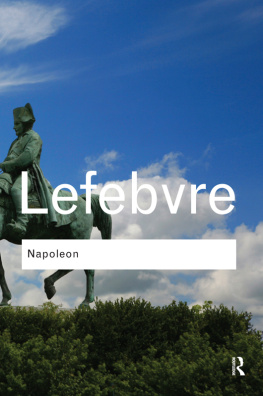CONTENTS
About the Author
Duff Cooper, statesman, diplomat and author, was born in 1890. He won the DSO for conspicuous bravery in the First World War, and entered Parliament in 1924. His life was devoted to politics until 1938 when, as First Lord of the Admiralty, he resigned in protest at the Munich Agreement. Called back to office by Churchill in 1940, he completed his wartime career as Ambassador to France. He wrote six books, including Old Men Forget, Operation Heartbreak and a classic biography Talleyrand. Duff Cooper became 1st Viscount Norwich in 1951. His wife was the famous beauty Lady Diana Cooper; his son is the writer John Julius Norwich. Duff Cooper died in 1954.
About the Book
Duff Coopers classic biography charts the remarkable progress of Talleyrand; a silver-tongued master diplomat, infamous turncoat, peacekeeper and libertine. Talleyrand held high office in five successive regimes from Frances Ancient Regime, into the Revolution of 1789, Robespierres Terror, Napoleons epic wars, and on through restored kings to more revolution. Duff Cooper brings Talleyrand vividly to life and paints an exhilarating picture of this tumultuous period in European history.
See also: The Prince
TALLEYRAND
Duff Cooper
This ebook is copyright material and must not be copied, reproduced, transferred, distributed, leased, licensed or publicly performed or used in any way except as specifically permitted in writing by the publishers, as allowed under the terms and conditions under which it was purchased or as strictly permitted by applicable copyright law. Any unauthorised distribution or use of this text may be a direct infringement of the authors and publishers rights and those responsible may be liable in law accordingly.
Epub ISBN: 9781446468425
Version 1.0
www.randomhouse.co.uk
Published by Vintage 2010
1 3 5 7 9 10 8 6 4 2
Copyright Duff Cooper 1932
First published in Great Britain in 1932 by Jonathan Cape
Published in 1958 by Arrow
Vintage
Random House, 20 Vauxhall Bridge Road,
London SW1V 2SA
www.vintage-classics.info
Addresses for companies within The Random House Group Limited
can be found at: www.randomhouse.co.uk/offices.htm
The Random House Group Limited Reg. No. 954009
A CIP catalogue record for this book
is available from the British Library
ISBN 9780099541622
TO H.BELLOC
One
THE OLD REGIME
T HE childhood of a French nobleman in the eighteenth century was not usually the period of his life upon which he looked back with either affection or regret. The doctrine that parents exist for the sake of their children was not then accepted, and the loving care and hourly attention bestowed upon the children of today would have appeared ridiculous to sensible people. When Rousseau, the first man of sentiment, abandoned all his children, one after the other, to be brought up as unknown foundlings, his conduct was thought odd but not vile. The heir to the richest dukedom in France describes how his education was entrusted to one of his fathers lackeys who happened to be able to read, how he was dressed in the prettiest clothes for going out but how at home he was left naked and hungry, and how this was the fate of all the children of his age and class. The modern method reflects greater credit on the parents; but evidence is not yet sufficient to prove that it produces a superior type of individual.
Family feeling, however, which has always existed more strongly in France than in England, was certainly as prevalent and as powerful at that period as it is today. It was a sentiment that cared more for the interests of the family as a whole than for the interests of the separate members of the family. The individual was expected, and often compelled, to make sacrifices in order that the family might benefit. The Bastille, which, under the Old Regime, played such an exaggerated part in the imaginations of the ignorant, was principally used to enable indignant parents to obtain from their children that measure of obedience which they considered that the interests of the family decreed.
Charles-Maurice de Talleyrand-Prigord, who was born in Paris on 2nd February 1754, was in his earliest years a victim of these two apparently contradictory tendencies, parental neglect and family pride. He has set it upon record that, during his whole life, he never spent one week under the same roof as his father and mother; and an accident, which occurred to him in infancy while boarded out in the house of a poor woman in the suburbs of Paris, rendered him permanently lame, and therefore unfitted him, in the opinion of his parents, to inherit his fathers many titles, which, it was then arranged, should devolve upon his younger brother.
Yet it is not necessary to assume that these parents were inhuman; they were merely following the fashion of their time. They were most anxious to promote the interests of every member of their family, but they did not believe that the future welfare of a man depended upon constant supervision of his childhood. They desired, and sought to obtain, wealth and honour for each of their children, and they knew of only two channels through which wealth and honour could come to a gentlemanthe Army and the Church. But a cripple could not be a soldier, and a priest could not hand on his name and titles to his son, and they therefore decided that the second son should be the future head of the family and that the eldest son should enter the Church.
Soon after the occurrence of this accident, which was to exercise so fateful an influence upon his life, the child was sent upon a visit to his great-grandmother, the Princess de Chalais, who resided upon her estates in the province of Prigord. The months that followed were the happiest of his childhood. He found himself living in a period that had already passed away. The old Princess maintained a state of simple, feudal dignity, which the nobility of France had forgotten since Richelieu taught them to live at Court and to look for all preferment to the King. The independence of the aristocracy had vanished, but the quick-witted little boy was permitted to behold at Chalais, as he sat on a stool at the great ladys feet, a survival of the feudal system, and a vision of what France had been more than a hundred years before.
Every Sunday the principal gentlemen from the surrounding country would come to accompany the old lady to church. After the ceremony all the poor and the sick would collect in the hall of the chteau and they would be received singly by the Princess. Two sisters of charity would interrogate them as to their symptoms and prescribe the remedy. The Princess would then say where it was to be found and one of the gentlemen in attendance would proceed to get it. The chteau was full of medicines and unguents freshly prepared every year in accordance with ancient recipes. The sick people would take away also some herbs for their ptisan, some wine and other comforts, but what they valued most were the kind words of the lady who helped them and who felt for their sufferings.
Remembering the scene years afterwards he wrote: More thorough and scientific medicines employed, even equally free of charge, by doctors of the first reputation, would not have brought nearly so many poor people together and, above all, would not have done them so much good. There would have been lacking the main instruments of healingprevention, respect, faith, and gratitude. Man is composed of a soul and a body and it is the former that governs the latter. The wounded who have received consolation, the sick who have been persuaded to hope are already in a state to be cured; their blood circulates better, their nerves are strengthened, sleep returns, and the body revives. Nothing is more efficacious than confidence; and it is at its fullest force when it springs from the care and attention of a great lady, around whom are gathered all ideas of power and protection.










